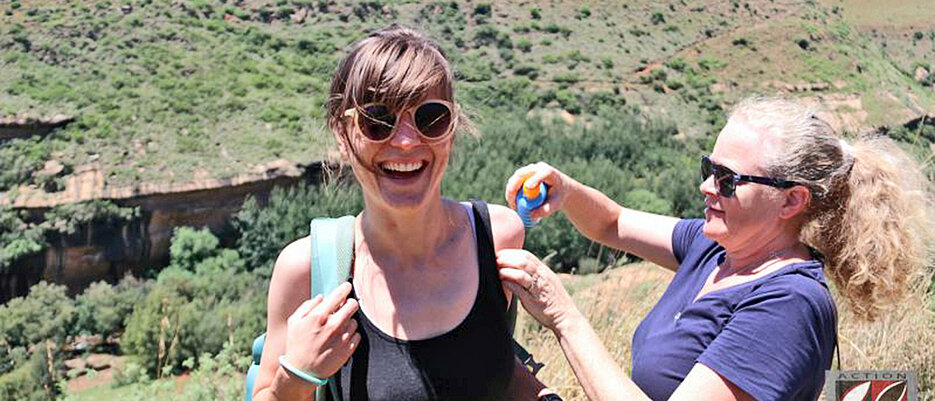From Würzburg into the world
01/31/2018Saskia Czimenga studied "Political and Social Studies" in Würzburg. Today, she works for an aid organization in Lesotho, a country where nearly one in four adults is HIV positive.
Which jobs do graduates from the University of Würzburg work in? To present different perspectives to students, Michaela Thiel, the director of the central alumni network, has interviewed selected alumni. This time, it is Saskia Czimenga's turn. Czimenga studied Political and Social Studies at the University of Würzburg. She supported the alumni office as an assistant during the international alumni project "Euro-Indian Week". She is presently employed with the non-governmental organization "Action Lesotho" in the Kingdom of Lesotho. At the same time, she is doing her master's in sustainable development cooperation.
Saskia, why did you pick Lesotho and how did you find the position? In August 2014, I travelled to Lesotho for the first time with the international cultural voluntary service >kulturweit< to do voluntary work with the Unesco National Commission for Lesotho. This time was very valuable for me, because I had to do with various international governmental and non-governmental organisations for the first time. It was through this work that I met my current boss. After I had completed my voluntary service, she suggested that I should apply for a job with Action Lesotho.
Can you describe your daily work routine there? I think my everyday work is not too different from a comparable job in Germany. I work in monitoring and evaluation where I currently spend 70 percent of my time in the office writing reports and analyses on the progress and impacts in the different programmes of the organisation. It gets exciting when I meet target groups or individuals for interviews to find out whether our work is productive and helps the target groups tap sustainable development options and sources of income. If you are interested in learning more about the projects, go to Facebook or visit http://www.actionlesotho.ie./
What do you like most about your work, the country and the people? What I like most about my job is that we are obviously successful with our programmes. It is great to see that my work is worthwhile and provides important input to the project managers to enable a better and easier implementation.
And what about the country and the people? The country lies entirely above 1,400 metres and has a uniquely vast landscape. If you drive into the mountains, it feels like you are sitting in a plane, not in a car. As far as the people are concerned, I have been astonished again and again by how friendly and cordially I was welcomed even in the smallest hut.
According to Wikipedia, Lesotho, also known as the "Kingdom in the Sky", ranks 161st out of 188 on the Human Development Index. What exactly does that mean? The Human Development Index (HDI) comprises three main factors: life expectancy, years of schooling and gross national income. When working with such metrics, one should always keep in mind what is being measured and how, but overall the ranking means that the life expectancy, duration of schooling and GNI are very low by international standards.
Which factors do you hold responsible for this? In Lesotho, an incredible fourth of the population is HIV positive and this impacts all other areas of life. For example, a lot of families are headed by children. Girls often drop out of school early to care for their family. But many school-age boys, too, have to tend sheep and cattle.
How does this manifest in everyday life? Fortunately, there are hardly any slums in Lesotho as in other countries, but the living conditions are far below Western standards. Roads, clean water, electricity and internet are rare, especially in peripheral areas. Infrastructure and educational achievement are the two major factors that have to be promoted, because they open up opportunities. And people need these opportunities to tap their potential.
In your experience, what is important for development cooperation to be successful? Time, patience and the willingness to understand problems. A large number of aid projects is geared to short-time successes to motivate donors to give more money. Unfortunately, very few projects are focused on sustainability as a result and once they end, you are back to where you started. The challenges in developing countries are very complex and cannot be solved with simple and standardised means. It can take years until you finally see what the problem is and why that is so.
What would you recommend to students who want to pursue a similar career path? Do internships and meet people working in this field. Also, you need nerves of steel, because a lot of things don't work out the way you planned and you are constantly facing new challenges before an idea can finally be put into practice.
Which memory of Würzburg do you like most? My best memories include the warm summer evenings with friends on the fortress wall or sitting on the banks of the Main enjoying a cool beer.
Thank you for the interview.
If you want to learn more about the alumni network of the University of Würzburg or register, follow the link below. https://www.uni-wuerzburg.de/alumni/







